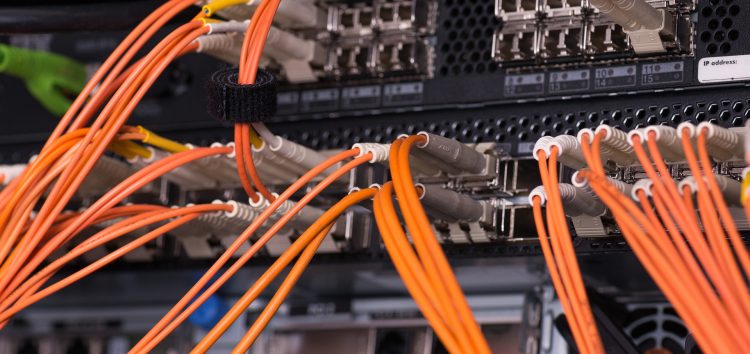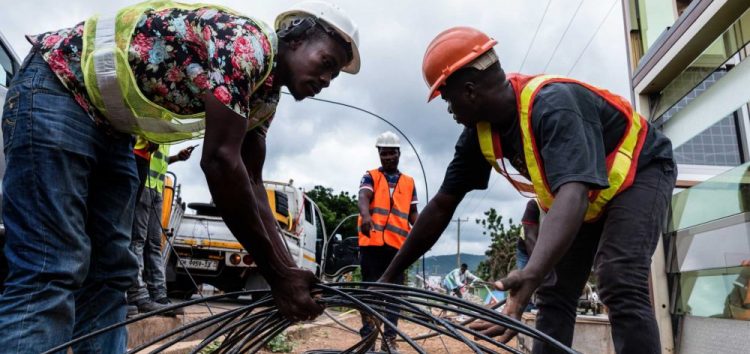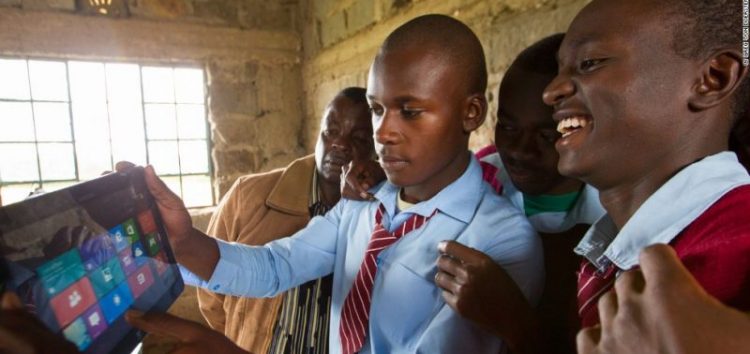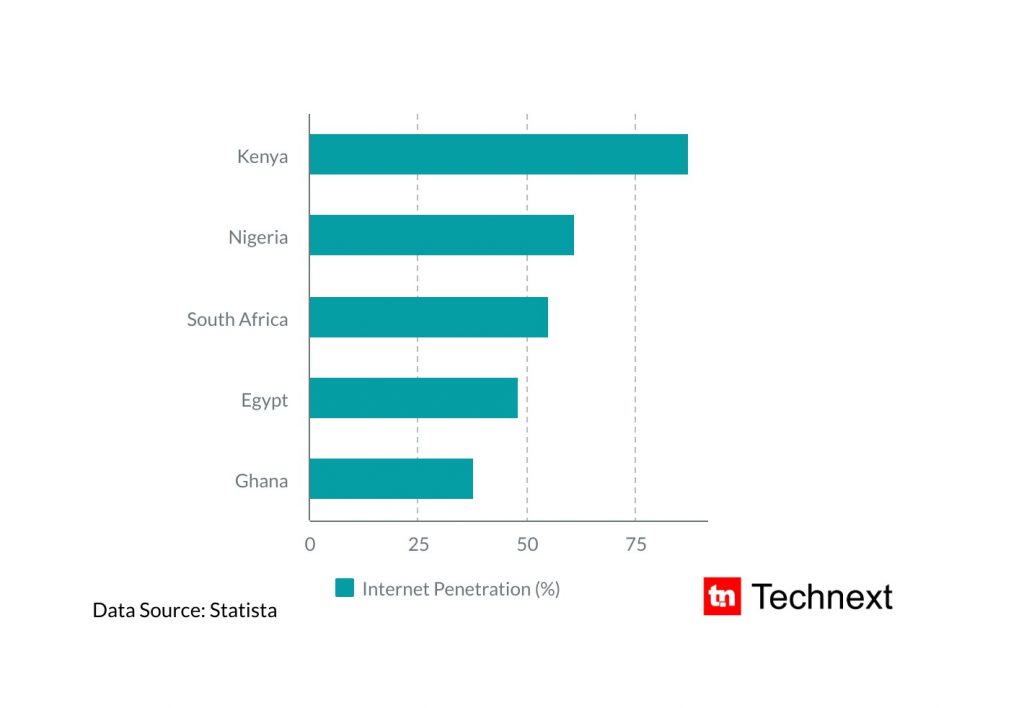Broadband fibre optic networks in Nigeria cover less than one-quarter (25%) of the total fibre distances in the country. This is according to a report by the Nigerian Communications Commission (NCC).
Expectedly, Lagos tops all other states with 85% in terms of population percentage with access to fibre networks within 5 km. Jigawa state ranks lowest with 12%.
These networks are concentrated in major cities such as Lagos, Abuja, Port Harcourt, and within Ogun and Edo states, while other areas remain underserved.


Only 54,000 km of a possible 216,000 km of fibre cables have so far been successfully deployed across the country, the report reveals. This goes to show the extent of the shortage in broadband infrastructure currently plaguing Nigeria’s ICT sector.
Nigeria’s Shortfall in Broadband Infrastructure
With broadband penetration in Nigeria still at 45%, solving the deficit problem of broadband facility is crucial to achieving the National Broadband Plan of 65% target by 2024.


However, several existential challenges continue to beleaguer the ICT industry. The NCC report highlights inadequate fiber infrastructure as one of the major difficulties hindering the effective deployment of broadband networks in the country.
Although there have been financial commitments made by the government towards the improved rollout of fibre optic cables, much doesn’t seem to have been done when it comes to actual disbursement and implementation.
In July last year, the government had approved a N126.7 billion credit facility for internet broadband expansion to 19 Northern states but as of now the project is yet to commence.
There is also little known on the progress of the NCC’s $732 million allocation to be released for an additional 30,000 km of fibre in four years.
Apart from these projects which have stalled, widely varying right-of-way (RoW) charges across different states in the country still constitute a stumbling block to broadband expansion.


For instance, Lagos continues to charge telecom companies N1,500 per linear metre of fibre compared to Ekiti state’s N145/m fee approved by the federal government. The absence of a unified RoW fee across the country keeps stalling the advancement of fibre networks. That said, the adoption of a harmonized RoW fee by state governments does not seem to be happening anytime soon.
Recurrent power outage is another huge challenge slowing broadband expansion. The majority of the fibre cables in Nigeria are deployed by mobile network operators, with MTN, Airtel and Glo laying 64% (34,436km) of the total fibre distance currently covered.
Also, these three operators altogether expend over N24 billion on diesel for generating sets to power their Base Transmission Stations (BTS). Apart from having to pay exorbitant RoW fees as well as deal with vandalism and theft, these high running costs disincentivises service providers from undertaking the rapid rollout of more broadband infrastructure.
Broadband Distribution vis-à-vis Internet Penetration
In Nigeria, the deployment of broadband infrastructure is concentrated in areas with significantly high levels of internet activity.


Going by Q1 2020 data from the National Bureau of Statistics (NBS), Lagos (17mn), Kano (8.3mn), Ogun (8mn), Oyo (6.9mn), Kaduna (6.4mn), FCT (6.1mn), Rivers (5.1mn), Edo (4.3mn), Delta (4.5mn) and Niger (4.5mn) account for over 50% (71.1 million) of Nigeria’s 136 million internet subscriptions across the 36 states and FCT.
Therefore, it is perhaps not surprising to see that the bulk of broadband infrastructure is located in 5 of these 10 states – Lagos, FCT, Rivers, Ogun and Edo.
Suggested read: ICT Contribution Rise to 15% as Nigeria’s Real GDP Drops to N70 Trillion in 2020
Telecom operators are predictably deploying more fibre cables in states with greater internet activity, although this comes at the expense of states with much lower internet penetration.
This explains why Bayelsa state, having the least amount of internet subscriptions (985,000), ranks second to last among states based on percentage of population (13%) with access to within 5Km of fibre cable network in Nigeria.
Broadband Percentage: How Nigeria Compares to the Rest of Africa
Nigeria currently has a broadband penetration of 45%. This means less than half of the population can access high-speed internet service. While the exact figures for broadband penetration in South Africa, Kenya, Ghana and Egypt are not readily available, only Kenya tops Nigeria in terms of internet penetration as of March 2020, according to Statista.


At 87.2%, Kenya’s internet penetration is higher than Nigeria’s 61.2%, South Africa’s 55%, Egypt’s 48.1% and Ghana’s 37.8%. This does not necessarily reflect the population of people with access to broadband, but it perhaps hints at Kenya having the highest broadband penetration in Africa. In 2018, the country’s 3G and 4G subscribers stood at 71% and 40% respectively.
Kenya deploys broadband infrastructure through submarine and terrestrial fibre cables just like Nigeria. But while operators experience power interruptions, they are not faced with the challenge of exorbitant right-of-way fees.
Going Forward
Despite infrastructural and policy challenges, Nigeria has seen broadband penetration increase by 24% in the last 4 years. However, to sustain increasing broadband coverage, the federal government and states must find a way to end disputes regarding RoW charges for telecom operators.
Also, the successful implementation of NCC’s national fibre project by the licensed Infrastructure Companies (InfraCos) is imperative. This would facilitate the execution of bulk fibre-laying activities in the scope necessary to drive significant broadband expansion.
Moreover, telecom companies could consider sharing infrastructure to cut down building and maintenance costs as well as lower the cost of network deployment.
Finally, the NCC should monitor and penalise telecoms operators who default on their universal service obligations as stipulated in their license documents. Such a move will ensure that operators roll out their broadband infrastructure to underserved and unserved areas in the country.






